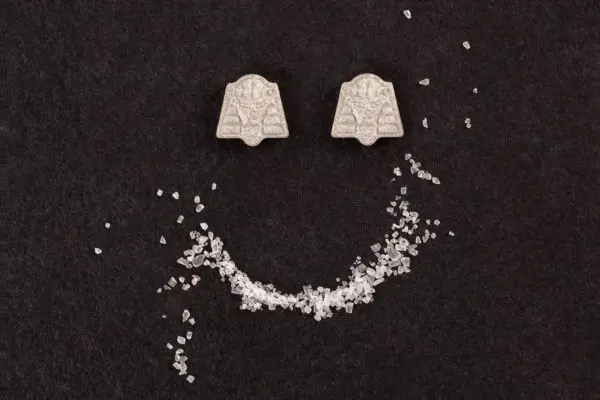Medical Editor: Dr. Lynn Marie Morski, MD, Esq
3,4-Methylenedioxymethamphetamine (MDMA) is a psychoactive drug researched as an aid to the psychotherapeutic process. In August 2017, the FDA designated MDMA as a Breakthrough Therapy for treating post-traumatic stress disorder (PTSD), and studies are underway for other potential uses. Personal recreational use is common, but MDMA is currently a Schedule I controlled substance and is not legal to manufacture or obtain outside of a clinical setting.
As research continues and more is learned about the beneficial uses for MDMA, it has become more important than ever to also be aware of how the substance impacts the mind and body. Raising these questions is a matter of ethics and safety when determining whether MDMA should be made legal and what kind of restrictions should control how it can be used. It’s also relevant for harm reduction if a person uses or is considering using MDMA.
Short-term effects are well documented, but the long-term implications of using MDMA are equally as relevant. Here is what research says about the long-term effects of MDMA, what factors affect different outcomes, and what is still unknown.
What is MDMA?
MDMA is an empathogen that produces feelings of euphoria, empathy, connection, and deeper meaning. It is a stimulant that increases energy and motivation while suppressing appetite. It may also alter perceptions and sensory intake, such as enhanced visual and auditory experiences.
MDMA was first discovered by a German chemist in 1912, who was attempting to formulate a medicine that would prevent excess blood loss. Since its creation, MDMA has had past applications as a patented pharmaceutical drug. The CIA even attempted to use it as a mechanism for mind control in project MK-Ultra during the Cold War.
Later, MDMA was used by therapists who realized its benefits for patients having difficulty with the psychotherapeutic process due to fears of revisiting past trauma. MDMA helps reduce the fear response and anxiety while facilitating more productive therapy sessions, so the participants felt more open to embracing the sometimes difficult path to healing.
After the United States ban in 1985 resulting from its rising popularity as a recreational drug, MDMA is now a Schedule I substance only used illicitly or in regulated clinical studies. Its legal status may change in the near future regarding therapeutic uses available to the general public, but the potential legality of personal possession and use remains controversial.
What are the long-term effects of MDMA?
Researchers have found that MDMA is mostly safe for physically healthy adults (without a mental health condition prone to psychosis or mania) using a measured dose of clinical-grade MDMA that is administered during a therapeutic session in a controlled setting.
The long-term effects of MDMA are difficult to assess because analyses have mostly utilized self-reported information from individuals with a history of personal MDMA use. Without knowing the exact quantity, level of purity, and frequency of MDMA use in the population of study participants, findings can not be deemed conclusive. Additionally, factors like polydrug use or unreported mental and physical health conditions may have affected individual outcomes.
Acute negative reactions seem to correlate with higher frequency and quantity of dosage, suggesting that the safety verified in clinical trials can be attributed to proper dosing and infrequent administration of MDMA-assisted therapy treatments. It is worth noting that immediate negative effects typically fade after the substance ceases to be active and can’t be assumed to indicate long-term harm.
MDMA incites a release of serotonin, which is unlikely to cause irreparable harm with a single dose but could negatively impact the production of this neurotransmitter and damage its receptors with chronic, sustained use. Serotonin, among other neurotransmitters like dopamine and norepinephrine, is responsible for mood regulation. Damage to serotonin receptors has been linked to mental health implications such as depression and anxiety. While the brain may be able to recover after the typical one-time dose in a clinical setting, unregulated personal use that becomes habitual may hinder the recovery process and have long-term implications that aren’t definitively known at this time.
The prefrontal cortex of the brain is where cognitive processes occur and many serotonin receptors are located, leading to concerns about long-term cognitive impairment associated with chronic MDMA use. However, testing of serotonin transporter (SERT) densities and memory function among individuals who were either current or former users of MDMA (alongside a control group that had never been exposed to it) yielded results that suggest abstaining from habitual use might reverse the effects of neurotoxicity. Additional research is necessary to confirm this possibility.
Individuals with heart conditions are discouraged from taking MDMA because it elevates systolic blood pressure and increases heart rate, which could have effects with long-term complications, such as heart attack or stroke.
MDMA is among several psychoactive substances that are considered unsafe for individuals with mental health conditions prone to mania or psychosis, as it can trigger or worsen these states.
MDMA produced for clinical purposes and deemed safe is known to be pure, whereas MDMA obtained illicitly for personal use (also called molly or ecstasy) is likely to be adulterated with other substances. One study in Australia found that of the 1,232 samples collected, 90 percent of them were contaminated with one or more of 18 different active substances. While pure MDMA alone is unlikely to cause a negative reaction with proper dosage, the same is not true of adulterated substances produced underground. Depending upon the contaminants, interactions could occur and have health and safety implications.
While the long-term effects of MDMA may depend on a variety of considerations such as the health of an individual and circumstances of use, there is evidence that certain adverse effects can subside with time. Therefore, it is speculated that ceasing frequent or high-dosage use could allow recovery of systems impacted by chronic MDMA use. It seems the best way to avoid any possible long-term impacts is to limit quantity and frequency of use and to test the substance for adulterants, however, additional research is required to fully understand the long-term implications of MDMA use.
If you’d like to speak with a practitioner familiar with the effects of MDMA, there are many professionals listed in Psychable’s directory who can help.









